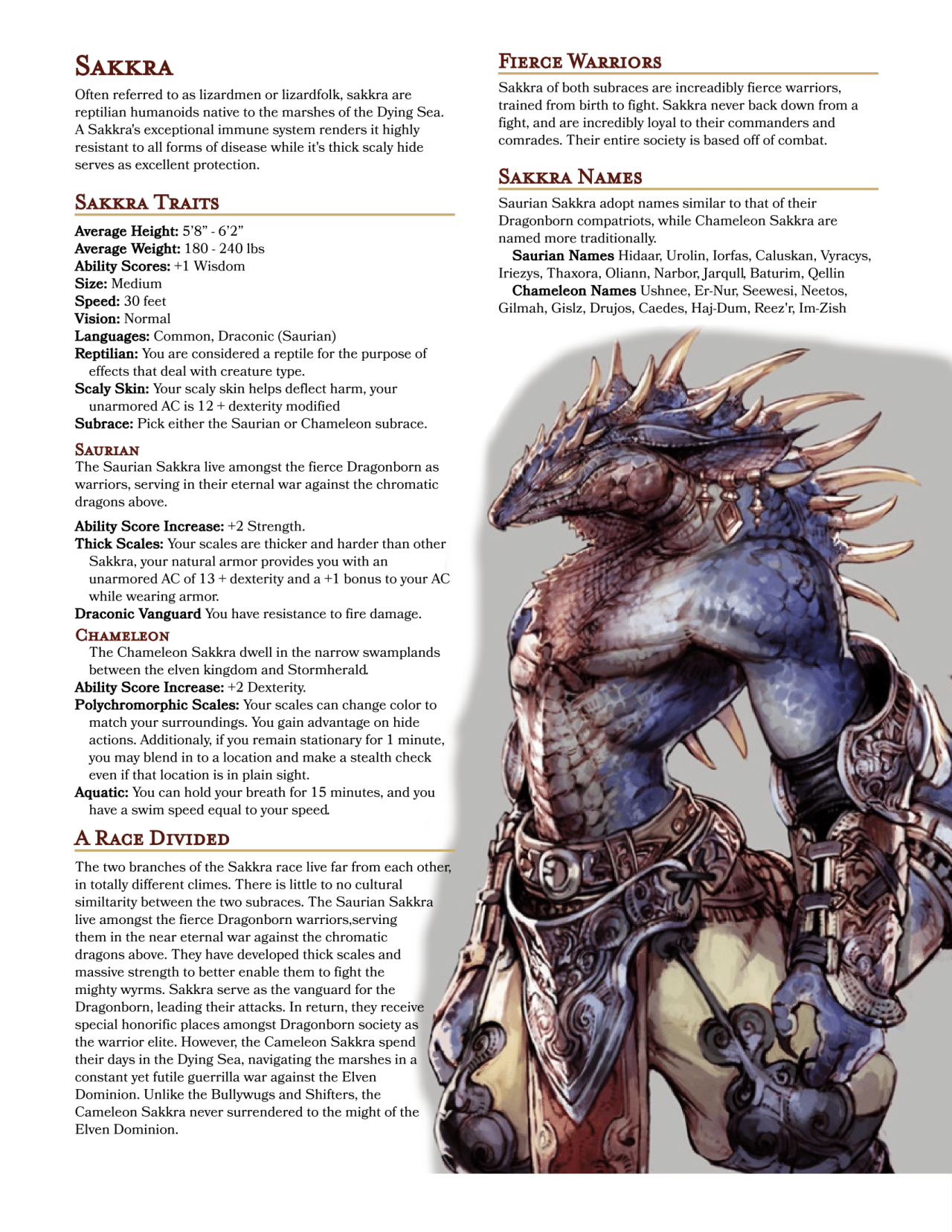
Here is a list of some of the best homebrewed playable races: What sort of abilities will your race have? Will they have any special resistances or vulnerabilities? How will they interact with other races in the game?Īnswering these questions will help you create a well-rounded homebrew race that fits seamlessly into your Dungeons and Dragons campaign. Once you’ve got the basics down, it’s time to start thinking about game mechanics. Or if you want to create a race of heavily-armored warriors, you could take the basic template of a dwarf and give them extra strength and constitution. If you’re using an existing race as a template, you can start by making a few changes to better fit your concept.įor example, if you want to create a race of flying creatures, you could take the basic template of an elf and give them wings. What kind of culture do they have? What are their customs? What sort of history do they have?

Once you’ve decided on the basics, you can start filling in the details. Will they be small or large? Fast or slow? Intelligent or gullible?

If you’re starting from scratch, you’ll need to decide what attributes your race will have. If you can’t find a race that fits your concept, you can always create your own homebrew race. One of the great things about playing Dungeons and Dragons is that you can create any sort of character you can imagine. You can homebrew anything in the DND game, so I thought we’d quickly go through some of the most common things DMs and players like to homebrew. When it comes to DND homebrewing, you have a lot of options. In that case, you could call it hybrid homebrew. If you do play a homebrew campaign but use items, maps, and more that come from the official rulebooks, then the only homebrew part of that game is the campaign itself. Recommended D&D Resources Price D&D Core Rulebook Set Check the latest price D&D Rules Expansion Set Check the latest price D&D Dice Set Check the latest price D&D Accessories Bag Check the latest price Recommended D&D Resources If you’re looking for these resources, here is a handy chart: The official Dungeons & Dragons rulebooks are those published by Wizards of the Coast. The easiest way to know whether or not something is homebrew is if any of the content– like monster design, storyline, encounters, maps, deities, classes, and so on– aren’t normally found within any official rulebook.
#DND HOMEBREW CHARACTER SHEET SERIES#
Some campaigns can be a series of adventures, stand-alone, or a mix of both.Īnd these campaigns can be made up entirely of homebrew content or mixed in with officially published ones. Players can incorporate and pull in existing settings, characters, and so on from already published adventures to their own homebrew campaign. Homebrew adventures do not need to be created completely from scratch. These sites include D&D Beyond and Roll20, to name a few. These additions have kept players invested in the game because of the vast possibilities they can come up with.Įven popular virtual tabletop sites have built-in settings for adding customizable elements when creating new characters. Today, from a strictly homemade campaign setting, the word homebrew has become an umbrella term that encompasses everything fan-made in DND: The first time it has been used in a DND context dates back to 2003 when a player referred to using a homemade campaign setting in contrast to an official one. The word’s use has since then extended to anyone whose hobby it is to create products that are normally produced commercially. The term was inspired by regular people creating or brewing their own beer at home, thus, homebrew. As previously discussed, homebrew refers to any fan-made additions or changes to the game which includes monsters, spells, magic items, and a whole lot more.

If so, the DM will come up with rules related to them, as needed.ĭungeons & Dragons, at its core, is all about imaginative storytelling, and the liberty to create your own rules and solutions gave way to homebrew adventures. The arbitrator of the game, called the Dungeon Master, can decide whether or not the solutions are viable. If the things they want to do aren’t explicitly stated in the rules or guidelines, players can come up with solutions to problems that aren’t in any rulebooks published by Wizards of the Coast.

But these rules and guidelines aren’t that strict. However, there is a bit more to it than that.ĭungeons & Dragons is a vast world with a lot of rules and guidelines for what is allowed and what is not. In short, DND homebrew is whenever a Dungeon Master (DM) or player character makes up something that is not in the official DND rulebooks. Please see my disclosure) My image made with Canva – What Is DND Homebrew?


 0 kommentar(er)
0 kommentar(er)
